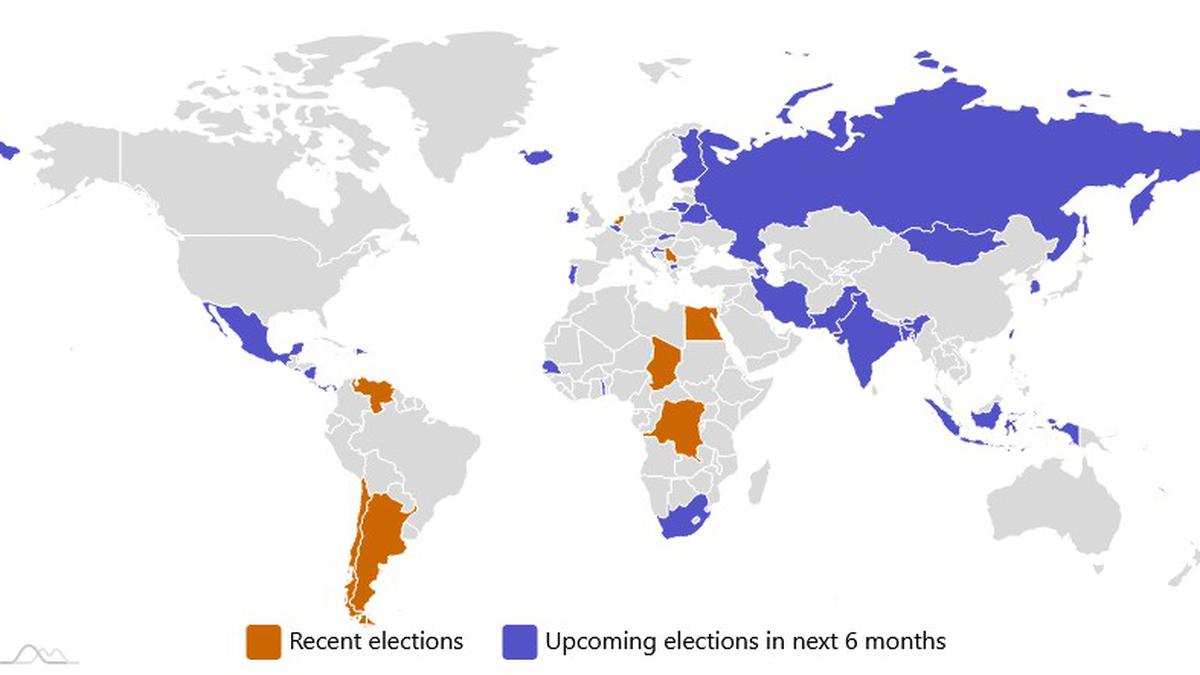
In biggest election year ever, politics may have impact India’s Foreign policy the most
The Hindu
2024: Domestic policy to shape foreign policy as 60 countries go to polls, impacting India's neighbourhood, global powers and Global South.
Domestic policy, rather than geopolitical events, could be a major factor in foreign policy in 2024, given that more than a fourth of the world, in terms of population and number of countries, will go to vote during the year. For India, which will hold the world’s largest election, the diplomatic calendar and focus will be decided by countries in the neighbourhood, global powers and major countries in the Global South, all of which will hold parliamentary or presidential elections next year.
According to the US-based International Foundation for Electoral Systems’ Election Guide, at least 60 countries around the world will see parliamentary, presidential or major Assembly elections over the next 12 months, with a likely population of more than two billion people casting votes. International commentators have called 2024 the “biggest election year” ever.
To begin with, India’s neighbourhood will see the impact of elections in the first few weeks of 2024 itself, with polls in Bangladesh scheduled for January 7, the second round of general election in Bhutan on January 9 and an election in Pakistan scheduled for February 8. The election in Bangladesh appears to be a “foregone conclusion” in favour of Prime Minister Sheikh Hasina’s Awami League (AL), with the largest Opposition party, the Bangladesh Nationalist Party (BNP) led by former Prime Minister Khaleda Zia, deciding to boycott the polls. The BNP has alleged the electoral process would not be free and fair and most BNP leaders are in jail. A columnist in the Bangladesh daily The Daily Star referred to the situation as “the rule of the AL, for the AL and by the AL”.
This will be a boost for Delhi-Dhaka ties, given PM Hasina’s close ties with India, but hiccups could be caused if the U.S. persists with its sanctions policy citing democratic processes in Bangladesh after the election as well, and the Indian government may have to step in.
In Bhutan, outgoing Prime Minister Dr. Lotay Tshering has already been ousted in the first round of election, and the contest is now between former Prime Minister Tshering Tobgay’s People’s Democratic Party (PDP) and former top-bureaucrat Pema Chewang’s new Bhutan Tendrel Party (BTP). While both will be inclined favourably towards India, Delhi will watch the new Bhutanese government’s moves with China most closely, as it picks up the boundary delimitation agreement signed with Beijing in September. The larger issue will be Bhutan’s Gelephu Mindfulness City (GMC) mega-project announced by its fifth King Jigme Khesar Namgyel Wangchuck in December, which will need major funding, investment and development by the government and Indian private infrastructure, health, and IT companies.
Pakistan’s election, like Bangladesh’s, appears one-sided at present, with former PM Imran Khan and most of his Pakistan Tehreek-e-Insaf (PTI) party’s top leadership in prison, even though they remain popular. The likely winner, three-time PM Nawaz Sharif, has already made it clear that he intends to improve ties with Pakistan’s neighbours, especially India, emphasising at an election rally that it was during his previous tenures that “Prime Minister Narendra Modi and former PM Atal Bihari Vajpayee visited Pakistan”.
Sri Lanka, still grappling with economic issues but on a more stable wicket due to support from India, is due to hold parliamentary and presidential elections in 2024, which could change Colombo’s course with Delhi too.











